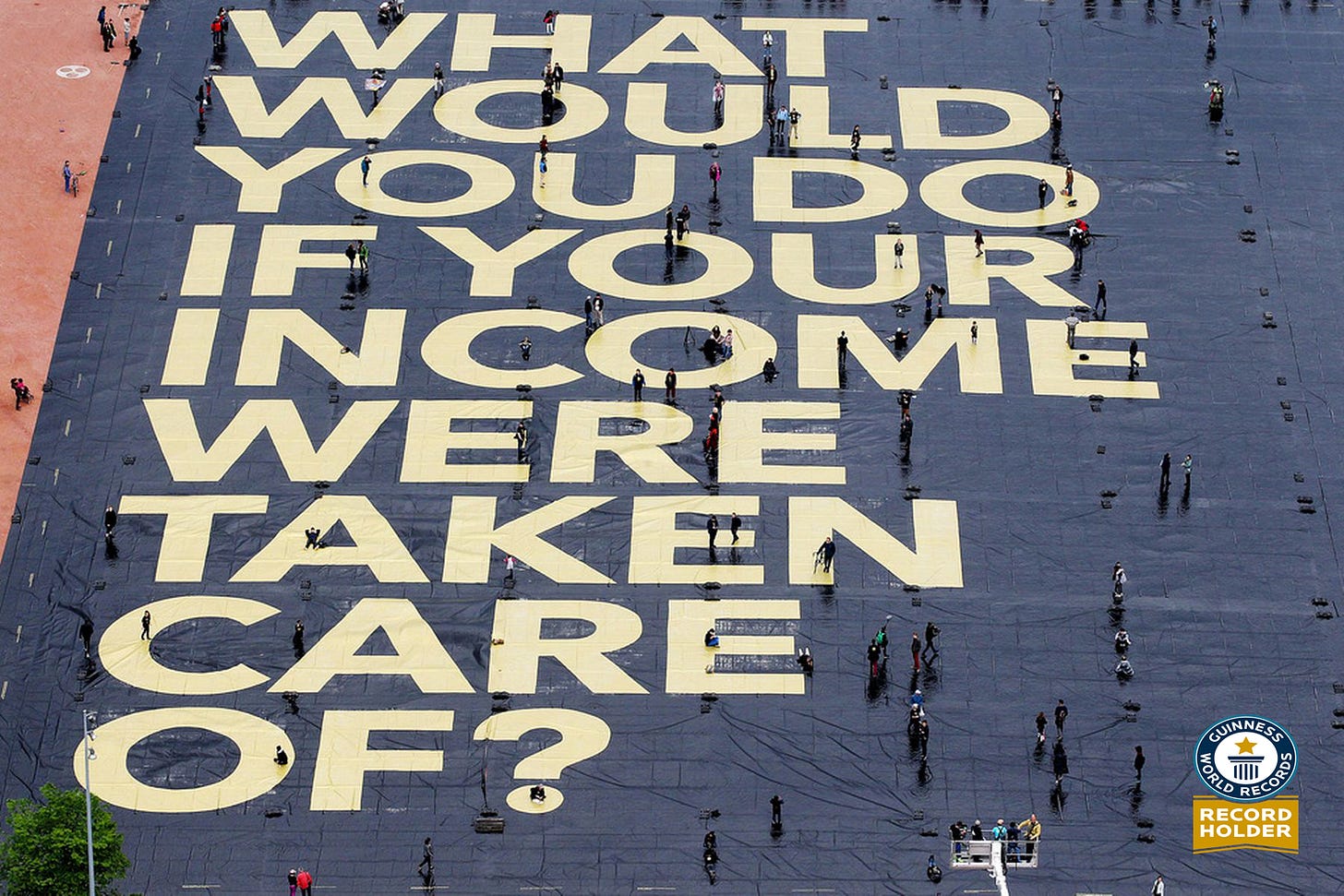Why Universal Basic Income is a Good Idea
UBI is a realistic policy that could raise societal standards by giving more power to working people.
I discussed more politics than I’d like over the holidays. The trigger was a claim advanced by an older lady—not my mom—sitting across from me during Christmas dinner. Namely, that Spain, in fact, never had any colonies. Such a ludicrous assertion does not warrant further inquiry. A more interesting proposition was put forward by another individual at the same dinner: that universal basic income (UBI) is a good idea.
At its core, UBI is a regular cash payment that every citizen receives unconditionally, without reference to other income or wealth. In this sense, UBI is a financial floor, not a social safety net meant to help individuals falling on hard times.
A standard criticism for giving money to people without any demands for reciprocity is that it will decrease willingness to work. This claim is incorrect. A study conducted in Stockton, California, showed that full-time employment increased (!) because income recipients leveraged their $500 per month to find better jobs. Similarly, a UBI programme of $500/month in Hudson, New York, saw employment increase from 29% to 63%. Once again, people show their true, vibrant colours when meaningfully empowered.
Then there is the objection that only those who contribute to society by working should gain access to public goods. Here, UBI goes further by acknowledging societal functions that are not salaried, such as parents taking care of their children or people looking after their elderly family members. This is not to say that UBI should replace current, condition-based welfare programmes. These safety nets should continue in effect, helping people who need them most.
Monetarily rewarding individuals for things they do outside an office will make people less reliant on work to survive. One will still need a job to become wealthy or successful in a given field, as UBI proposals don’t exceed $1000 per month per person. But gone will be the days when employers can use the threat of termination to excuse poor working conditions.
With workers empowered in this way, unionisation, for example, would become easier, allowing for the negotiation of better benefits—such as wages—and strengthening organised labour in general. People feeling more secure would grow the size of a country’s economy by increasing consumption and tax revenue. A strong working and middle class would, moreover, make society less antagonistic and decrease inequality. I’m willing to bet that the appeal of populist leaders in such an environment would almost disappear.
How will UBI be financed? By taxing the very rich, obviously. The net cost of instituting UBI in the United Kingdom has been estimated at £45 billion per year ($55.8bn). This is a high number, but a gap that’s not impossible to bridge. For instance, as I’ve stated previously, a 2% tax on individuals in the UK who own assets worth more than £10 million—applicable to 0.04% of the population—would raise £24 billion a year, more than half of the needed amount.
Wealthy individuals would still receive universal basic income, regardless of how little they need it. Such a sacrifice is crucial to underscore UBI’s unconditionality. But, since richer people pay higher taxes, they will not be net beneficiaries.
The main obstacle confronting UBI is, however, not empirical or financial. It’s political. Specifically, under our current economic model, it is, ultimately, not in the interest of companies to embolden their employees, even if it would lead to higher profits via increased sales to workers with more money to spend. This antagonism has shown itself at the macro level, with organised labour losing much of its power since around 1980.
As Polish economist Michał Kalecki prophesied in 1943, business interests would never commit long-term to the New Deal economic paradigm of full employment because:
“‘[D]iscipline in the factories’ and ‘political stability’ are more appreciated than profits by business leaders. Their class instinct tells them that lasting full employment is unsound from their point of view, and that unemployment is an integral part of the ‘normal’ capitalist system.”
The insistence on viewing working as a condition to not only participate in society but to be able to live is nothing but an extension of Kalecki’s logic—it does not favour the majority.
Cynical arguments of human nature are pervasive because they are spread by the corporate-owned media (don’t forget to subscribe), not because they are true. As shown by various UBI pilot studies, when given more economic security, people do not stay in bed all day. The threat of poverty should not be what motivates people to work. If so, the job—or the conditions under which it is performed—is not worthy of human labour.
UBI is a realistic policy that could raise societal standards by giving more power to working people. Today, perhaps more than ever, the world needs initiatives that mitigate the growing inequality ravaging our societies. Lest labour relations turn into a modern version of Spain’s 16th-century encomienda system, an organised form of serfdom which, as I tried to tell the lady at Christmas dinner, only served the people on top.
// Adrian





